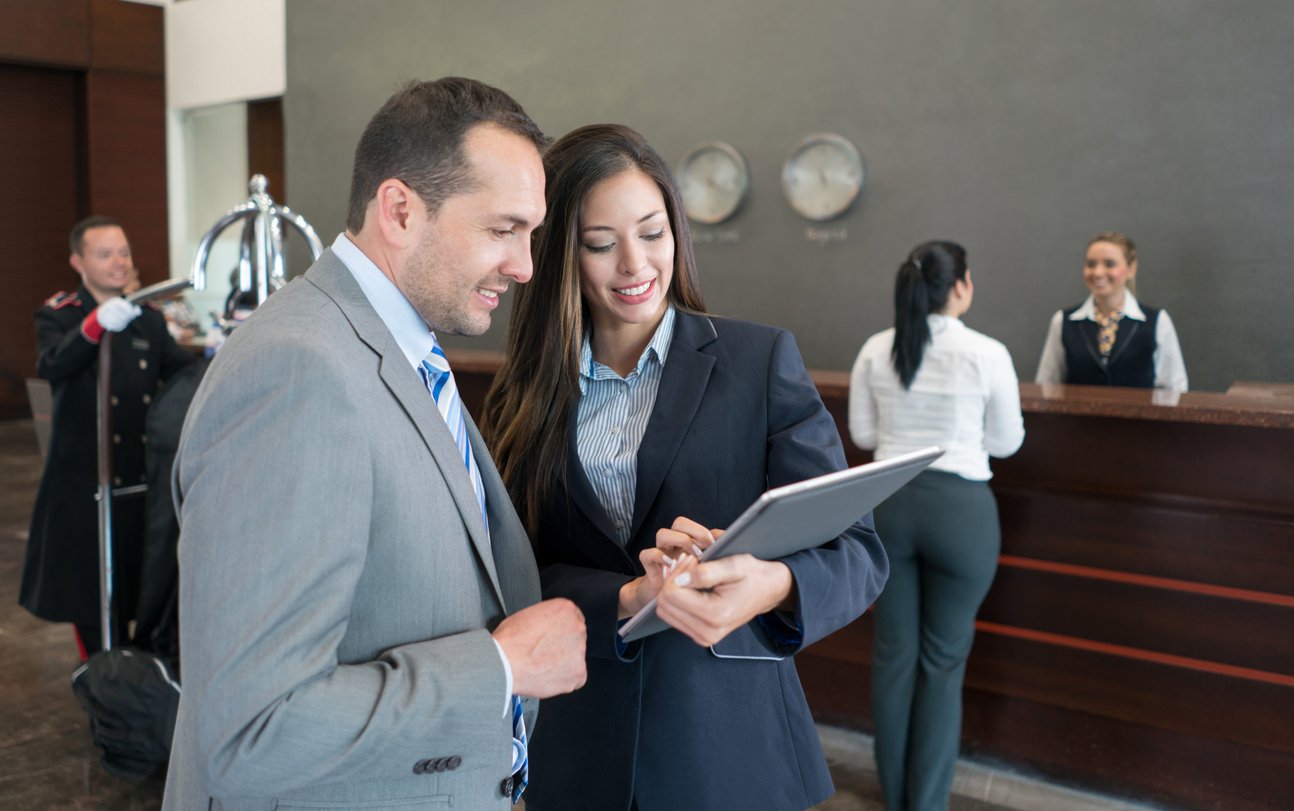Hotel Yield Management: Everything You Need To Know
Hotel yield management is a pricing strategy utilized by businesses in the hospitality sector to maximize profits and...
Table of Contents
Effective hotel revenue management is perhaps more important to hospital businesses today than ever before. Running a profitable and successful hotel by selling the right hotel room, concert seat, or event entry, at the right time, for the right price, through the right channel, and with the utmost efficiency is paramount. The wealth of performance and analytics data available to owners and revenue managers should be taken advantage of so they can not only discover areas of improvement but also ensure they remain competitive.
Statistics such as demand and forecasting, in addition to effective inventory management, are essential components in an effective revenue management strategy. Hotels can maximize revenue-generating opportunities by creating effective hotel revenue management strategies that are data-driven and considering dynamic pricing models.
In this article, we outline what hotel revenue management is, some effective strategies to employ, and how LuxSell and HouseCount RMS contribute to making hotel revenue management more effective and efficient, resulting in increased profitability for your hotel.
Boosting business income is the primary purpose of hotel revenue management. Revenue managers utilize pricing tactics and strategic distribution to maximize both demand and overall revenue per available room (“RevPAR”). Revenue management can also expand beyond the point of initial purchase to also include optimizing the various upsell points along the customer purchase experience.
For instance, casino hotel operators often employ a total revenue management approach (TRM). This considers guest spending beyond hotel room revenue and incorporates spending behavior in other revenue-generating areas throughout the resort. By being able to capitalize on opportunities to contribute to total guest revenue, it’s easier to employ effective hotel revenue management strategies.
Discussed in the next section are three key topics central to modern hotel revenue management.
HouseCount RMS provides insights and data views, allowing different departments to view and interpret pricing strategies and always be on the same page regarding the right moves to maximize overall hotel performance.
Demand in hotel revenue management strategies is a direct reference to the level of consumer interest and need. These could be for more than hotel rooms, including theater and event space, conference rooms, etc.
The demands for services and rooms can vary greatly. For example, hotels in Florida are in their high season in March and April when coeds from across the county go on spring break, while October to December or January can see their reservations drop by 50% due to the low season.
Pricing is generally amplified as demand grows, and the same happens when the market shrinks. HouseCount RMS offers a dynamic pricing solution that can handle room prices autonomously based on current market dynamics.
Utilizing a demand calendar in a hotel revenue management strategy aids in making informed pricing decisions based on concrete statistics.
Revenue forecasting is a crucial part of any hotel revenue management strategy because it lets hoteliers and/or pricing systems make critical decisions regarding distribution, promotions, and pricing based on expected demand and performance.
Hoteliers use revenue management software to extradite historical data and market trends to predict future demand. Data, such as occupancy rates, ADR (average daily rate,) room nights sold, arrivals, departures, and monthly revenue fluctuations, are considered when performing a hotel sales forecast.
This can be a very tedious and time-consuming process. Additionally, demand is not a singular value but is instead a function of price. Basic economics dictates that demand grows and shrinks in response to price changes, so accounting for the impact of price changes is critically important to accurate forecasting.
HouseCount RMS tackles the forecasting problem by using real-time demand statistics in unison with advanced feedback control concepts to create a robust and stable forecast, yet quickly able to change based on changing market dynamics. This informs optimal pricing decisions and allows operations to know how to staff on future dates accurately.
Hotel revenue forecasting aims to determine the hotel's future demands and adjust the strategy to maximize earnings.
Effective Inventory management falls into two categories:
While price is the main consideration for influencing demand, it is often necessary and desired to control demand via open-close signals. This is especially the case for demand channels that have fixed pricing such as promotional and direct marketing offers.
Casinos deal with this type of demand quite regularly and must keep fixed-price channels in line with dynamic pricing strategies. This may be accomplished by dynamically turning on-and-off price channels based on the prevailing rates for the hotel. This process is often referred to as “yielding”.
Like many processes in hotel revenue management, yielding can be quite dynamic and time-consuming to do manually. When implementing price changes, a pricing professional must also consider which offers to keep “on” versus “turn off” based on the value of the offer as well as the expected ancillary revenue to be generated from these guests.
HouseCount RMS automates the yielding process by creating an “auto-yielding” framework. This framework is able to perform effectively by working closely together with rate changes. When rate changes are made by a revenue professional or via HouseCount RMS’s autopilot functionality, specific yield instructions are automatically sent to the PMS in parallel to ensure these channels are always equivalent.
While effective yielding may help hotels optimize new bookings, there is an additional benefit in optimizing current reservations by moving each reservation up the “value ladder”. Unless a guest is booked into the most premium suite on the property, there is an opportunity to move them up by providing special upgrade offers. These offers provide guests value and help hotels greatly monetize otherwise unused inventory. These upsells can occur at various touch points between when a guest first books and when they show up to check-in. However, upsells at check-in typically drive the highest conversion rates and overall upgrade revenue simply because it is an impulse purchase, with the guest being able to benefit from the upgrade immediately.
Hotels often employ manual strategies at the front desk to incentivize upgrades. These traditionally have been managed manually with spreadsheet-based static upgrade price grids that are shared with front desk teams. A consistent upsell program combined with consistent training and accountability can add significantly to a hotel’s overall RevPAR.
LuxSell URS automates this process by curating the upgrade offers and price points expected to maximize upsell revenue and customer satisfaction. LuxSell’s advanced offers engine considers both price elasticity and room types constraint to maximize upgrade revenue. The platform also provides real-time performance feedback to hotel management, allowing them to identify and act on opportunity areas.
By moving guests up the value ladder, more revenue is extracted from existing bookings, and base inventory is freed up to continue selling to other guests.
From upsell opportunities to accurate price management, Luxe Pricing is here to maximize your revenue.

The driving force behind any successful hotel is an effective revenue management strategy. In the hospitality industry, business owners can anticipate demand and optimize pricing and availability, helping to deliver the best financial outcome possible. Comprehending consumer demand trends helps sell rooms at the best price, utilizing the correct distribution platform.
However, even though a hotel has high occupancy doesn't mean that it is always profitable. Multiple nuances affect earning optimization and hotel revenue management strategies.
Utilizing hotel revenue management software, hoteliers can maximize profits or optimize the profitability of their inventory by establishing specific rules to suit their company’s expectations or creating customized accommodation rates. Managing your hotel's revenue is not a one-size-fits-all solution, but instead, a practice that requires adopting and fine-tuning plans over time that works with your hotel’s value proposition.
Although other hotel revenue management strategies exist, four prominent ones increase earnings.
Ensuring maximum occupancy for a hotel based on supply and demand and boosting revenue is the goal of dynamic pricing. Business owners or managers use time-based pricing strategies to manipulate prices through advanced algorithms.
When demand slows, rates will drop to capture the attention of guests looking for accommodation. And when demand is high, the establishment utilizes dynamic pricing to charge higher rates.
Dynamic pricing also reacts to decreasing or increasing demand as a specific check-in date approaches and updates room rates based on remaining availability. For example, if a hotel is almost sold out, but demand is still significant, dynamic pricing strategies will increase room rates to pull as much revenue as possible.
Hotel owners experience the following three benefits when implementing a dynamic pricing strategy into their hotel revenue management plan:
Dynamic pricing is often a big part of hotel operations and revenue management strategies, and a robust RMS can help with that.
HouseCount RMS analyzes input, such as portfolio demands, historical data, and more, to determine prices for future available dates. The system's parameters can also be adjusted to override recommended prices to align with the hotel owner's or management team’s expectations.
Dynamic pricing systems connect directly to third-party applications or distribution channels to apply active rate feeds correctly. Below is a table showing the advantages and disadvantages of a fixed and dynamic pricing model:
|
Pricing Model |
Advantages |
Disadvantages |
|
Fixed |
|
|
|
Dynamic |
|
|
By leveraging revenue management software with dynamic pricing, business owners can introduce marketing trends into their plans while keeping their hotel rates competitive throughout the year.
The prediction of future guest demands over a defined period is known as hotel demand forecasting. This process helps hotels manage stock and inventory levels more efficiently. Other projections also depend on it, including:
With more accurate demand forecasting, hotel business owners can make intelligent operational decisions. Other than that, three types of forecasting demands are generally included within hotel revenue management strategies:
Operational forecasting: Focuses on operational aspects of a hotel, such as the front desk, housekeeping, and point of sale.
Financial forecasting: Predicts what future expenses and hotel revenue are estimated to be in the future.
Revenue management forecasting: Predicts when consumer demand rises and falls with the help of market data, including overall market performance.
Like many industries, the hotel industry is undergoing extensive digital transformation.
Revenue managers help fill some massive gaps in the industry, but their jobs are often much too time-consuming, paper-pushing, and tedious.
Enter hotel revenue management strategies and tools like HouseCount RMS that were built to help these revenue managers forecast better with analytical information. With HouseCount, hotel revenue managers are able to establish a plan, set objectives, and dive into business data to get a dynamic overview of a demand forecast report.
HouseCount RMS gives hotel owners in-depth information about room booking velocity, position, price variations, and more. This data is unparalleled when forecasting demand for your hospitality business.
From upsell opportunities to accurate price management, Luxe Pricing is here to maximize your revenue.

Searching for market trends within the hospitality industry is a must for staying ahead of the competition. A market trend analysis analyzes current and previous market behavior, including dominant patterns of the space and its consumers.
This information allows you to assess risks and opportunities within the market. Fundamental analysis of the average revenue per room sold, the average room price per day, and the average occupancy rates can help determine a market trend.
However, many other aspects are essential to market trend analysis as well:
A hotel market survey can reduce the risk of misinformed decisions, reveal untapped growth potential, and uncover potential market gaps. Quality data is the foundation of a well-structured hotel market analysis.
Utilizing market research, hoteliers or revenue managers can identify trends in the market and evolve the establishment to stay highly profitable and ahead of competitors. Gathering past data can help a new organization understand market changes and anticipate future trends.
Hotel upselling is a revenue-generating strategy that involves promoting and selling an upgraded service or room to guests. The goal is to incentivize the guest to spend more while receiving additional value on their already booked package.
Upselling is a crucial component of hotel revenue management strategies that offers guests a wide range of extras, including:
Upselling at the right moment is the key to success. Knowing when the demand for an upgrade or extra feature is high is critical to selling at the right time.
Think about when a guest is booking their stay. While going through the reservation process, LuxSell provides the right offer through a continuous machine learning framework. Using micro-experimentation, every upsell processed through LuxSell contributes to the efficacy of the system.
Hotels can use LuxSell to upsell at the moment that visitors arrive to check-in or when they make their booking.
From upsell opportunities to accurate price management, Luxe Pricing is here to maximize your revenue.

There are a plethora of reasons hotels should incorporate technology into their hotel revenue management strategies including:
Utilizing the correct hotel revenue management software will significantly minimize the human resources spent. Platforms like HouseCount perform most of the work automatically and allow revenue managers to focus their energy on more essential tasks, such as providing guests with an incredible experience.
On the other hand, LuxSell and other property management systems help streamline processes and track agent upselling performance while identifying coaching opportunities for the representative. These software platforms utilize machine learning to create custom offers for guests, prompt employees before clients check-in, and automate dynamic pricing if you require it.
Developing a hotel revenue strategy takes time and patience. Incorporating multiple considerations and perspectives into the business plan to increase revenue helps to make more accurate estimations. The next step would be automating manual processes so that the company runs more efficiently.
Using Luxe Pricing, hoteliers can take control of their organization and optimize accommodation rates. Request a demo and find out how Luxe Pricing can maximize revenue in your hotel business.




Get Hooked! Sign Up to get the latest catch sent to your inbox.
Hotel yield management is a pricing strategy utilized by businesses in the hospitality sector to maximize profits and...
A hotel packed with guests does not always mean it’s profitable. Understanding the hotel’s overall revenue primarily...
Deciding to invest in a reputable hotel revenue management software is a no-brainer. And if you still aren’t convinced...